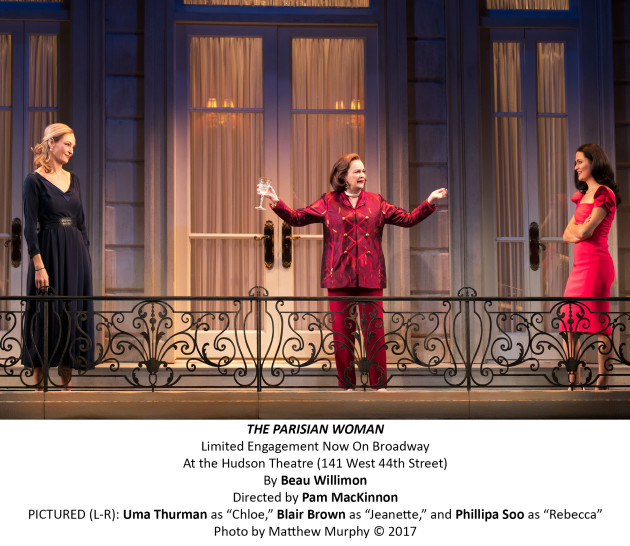
by Aileen Jacobson
Your Jewish and Frankly Feminist Review of “The Parisian Woman”
 A female nominee to chair the Federal Reserve. A male contender for a federal Court of Appeals position. A striving young some-day female president. And, at the center of it all, movie star Uma Thurman making her Broadway debut as Chloe—a conniving political wife doing her utmost to secure a powerful position for her husband.
A female nominee to chair the Federal Reserve. A male contender for a federal Court of Appeals position. A striving young some-day female president. And, at the center of it all, movie star Uma Thurman making her Broadway debut as Chloe—a conniving political wife doing her utmost to secure a powerful position for her husband.
“The Parisian Woman,” a snappy, entertainingly slimy 90-minute comedy that has just opened on Broadway, certainly has many characters and themes for a feminist to ponder. It’s set in Washington, D.C. in the “present”—yes, right in the middle of the ever-evolving Trump presidency.
While it makes no overt references to Jews aspiring to or attaining high office, that doesn’t mean there is nothing for Jewish feminists to gnaw on. For instance, there is the choice by playwright Beau Willimon (creator of the corrupt-politicians-themed Netflix series “House of Cards”) to showcase the job of Federal Reserve Chair, which is currently held by Janet Yellen, a Jewish woman. Her fictional counterpart, Jeanette Simpson—wonderfully portrayed by Blair Brown as a blunt, and often funny, political pragmatist—is not, however, identified as Jewish. But she could be: She is inordinately proud of her daughter, Rebecca (Phillipa Soo, a star of the original “Hamilton” cast), though kvelling is hardly confined to Jewish mothers.
“The team is finally starting to come together,” Jeanette, depicted as an honorable person, says of the President and his appointees. “People can criticize all they want—and sure, he’s rough around the edges—but everyone acting like there’s some crisis? No. Everyone needs to calm down, shut out the noise and keep their shoulders to the wheel. We’re going to keep the country moving forward. Everything’s okay. We can manage him.”
In Brown’s performance, under the gifted Pam MacKinnon’s jauntily-paced and precisely calibrated direction, Jeannette may be trying to convince herself as much as her listener. Jeannette’s pro-administration pronouncements often drew laughs, as they were meant to, from a recent audience that was probably largely New York and Democrat. And perhaps it did from Republicans, too, especially since the play shows Democrats behaving despicably. Though playwright Willimon is an equal-opportunity slimer of politicians, his play has a definite anti-Trump edge that elated the audience.
(There is also a brief mention of Ivanka Trump as an attendee at a Republican fund-raising party. “I find her charming,” Peter, an influential Republican donor who figures in the story, tells Chloe. “I’m so impressed every time I speak with her.”)
Thurman acquits herself admirably in a role that calls on her to be a sexy, charismatic power player in the Washington cesspool. She and especially Brown stand out in this handsomely mounted production at the recently refurbished and reopened Hudson Theater. The other actors are strong, too: Josh Lucas as Tom, Chloe’s boyishly-charming tax-attorney husband, who desperately wants to become a judge; Marton Csokas, as Peter, a Republican whose role shouldn’t be described too exactly, since the play relies on surprise revelations for much of its humor; and Soo as the ambitious young woman, Rebecca, who hopes one day to be President.
The title’s “Parisian Woman” is a sobriquet based on Chloe’s having spent some formative time in Paris soon after graduating from college. It’s also a nod to “La Parisienne,” an 1885 play by Henri Becque that Willimon says “inspired” his work. Scandalous in its day, Becque’s play centered on a married woman and her two lovers, a situation that Willimon has updated and transformed.
Furthermore, he has changed elements from its initial production in 2013 at the South Coast Repertory in California (also directed by MacKinnon but with a different cast), to keep it even more ripped from the headlines. He has said, “One of the things I love about the theater is that you can respond to the present moment in real time.” A question that Jeanette asks of her daughter during a party sounds as though it could have been added within the past month: “No one’s been inappropriate, have they?”
This is not a play for the ages, but a provocative amusement for the moment. Maybe someday it will be considered a significant artifact of our present.
The views and opinions expressed in this article are the author’s own and do not necessarily reflect those of Lilith Magazine.